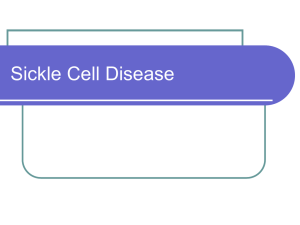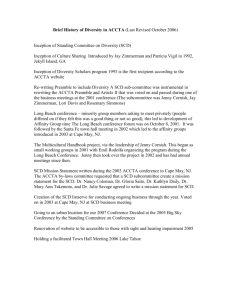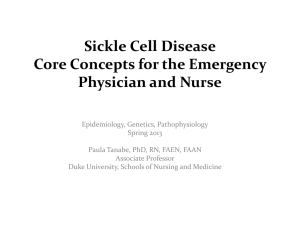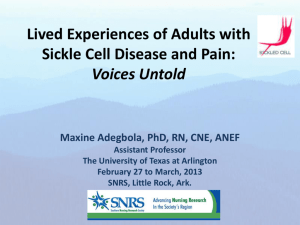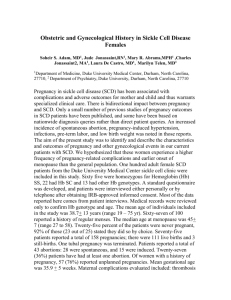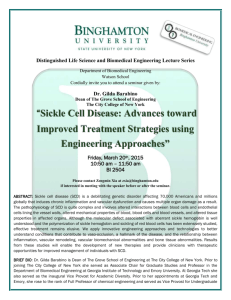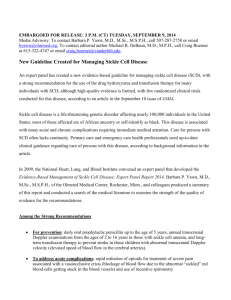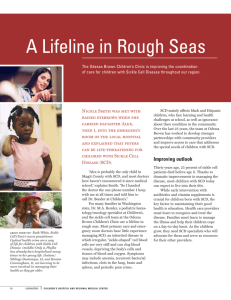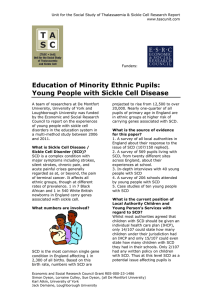Like us on Facebook for more information and updates.
advertisement
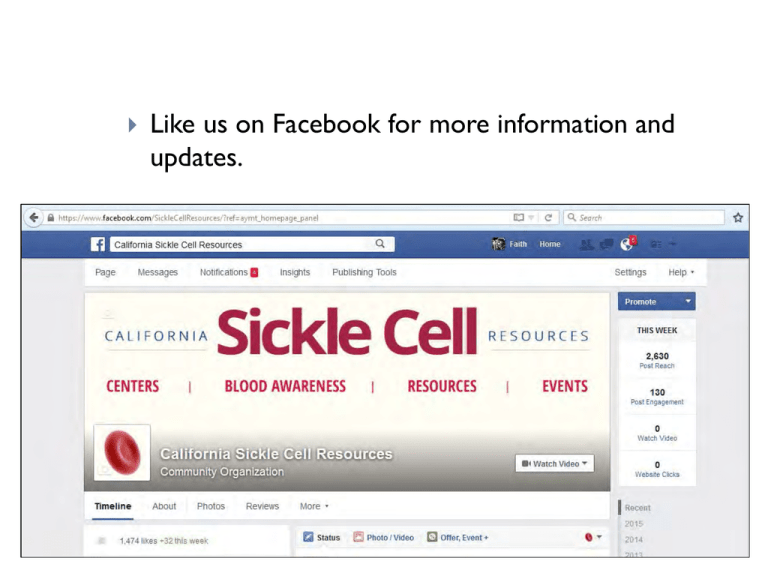
Like us on Facebook for more information and updates. California Sickle Cell Disease Longitudinal Data Collection Project Susan Paulukonis, California Rare Disease Surveillance Mary Hulihan, Division of Blood Disorders, Centers for Disease Control and Prevention Public Health Surveillance The ongoing, systematic collection, analysis, interpretation, and dissemination of data regarding a health-related event Reasons to do surveillance in SCD Reasons to do surveillance in SCD Reasons to do surveillance in SCD History of CDC surveillance in SCD Registry and Surveillance System for Hemoglobinopathies (RuSH) Collaboration with NIH/NHLBI 2 year project; 7 states Goal: Identify all individuals in each state with an SCD or thalassemia diagnosis using pre-existing data sources Public Health Research, Epidemiology, and Surveillance for Hemoglobinopathies (PHRESH) 2 year project; 2 RuSH states + 1 new state Goals: Evaluate and validate RuSH methods; Implement activities in a new state with reduced funding amount; Disseminate information Longitudinal Data Collection System for SCD California and SCD data collection Newborn screening as public health surveillance Clinical research/cohorts Administrative data research CDPH joins CDC efforts CDPH Genetic Disease Screening Program, Dr. Lisa Feuchtbaum Inclusion of 90% of expected cases Key Findings in CA (RuSH/PHRESH) Pediatric vs. adult clinical populations Death certificates unreliable Multiple data sources needed for complete surveillance High health care utilization is intermittent Adults over 40 have different needs 51% of adults live in Los Angeles County CA Rare Disease Surveillance Part of the CA Environmental Health Tracking Program, a partnership between CDPH and the Public Health Institute Staff flexibility and capacity Key personnel: Paul English, Co-PI Faith Raider, Health Educator Jhaqueline Valle, Data Analyst Justin Howell, IT and Data Linkage Oversight Eric Roberts, Biostatistics Dan Meltzer, GIS/Mapping Data Collection and Methodology Phase I 2015-2016: State IRB approval (submitted) Approval to use data already acquired Requests for new state data Standardization of data Approach clinical sites about case reports Data Linkage and Case Profiles Phase II 2016-2017: Refine data linkage algorithms Link and de-duplicate state data IRB approval from clinical sites Contracts and data use agreements from clinical sites Data collection from clinical sites Integration of clinical data into system Data Linkage and Case Profiles Phase III 2017-2020 and beyond: Continued integration of new state and clinical cases annually Analysis, dissemination, collaboration, education Establishing Goals for Surveillance Prioritizing use of the data Why collect data? To change care, outcomes and quality of life Collaborating with and supporting local and national efforts Bringing attention to healthcare disparities Answering questions Engagement of Stakeholders June / July Meetings Information needed Needs of the community Feasibility Engagement of Stakeholders American Society of Hematology Association of Public Health Laboratories Blood Centers of the Pacific/Blood Systems Research Institute California Health Care Foundation Center for Inherited Blood Disorders Children’s Hospital Los Angeles Children’s Hospital Orange County Health and Human Services/Office of Minority Health Health Resources and Services Administration/Maternal and Child Health Bureau Kaiser Permanente Southern California The KIS Foundation Loma Linda University Medical Center National Institutes of Health/National Heart, Lung, and Blood Institute National Medical Association Northern California Sickle Cell Advisory Council Sickle Cell Disease Association of America Sickle Cell Disease Foundation of California UC Davis Hematology Clinic UC Irvine Medical Center UCSF Benioff Children’s Hospital Oakland Parents of children living with sickle cell disease Adults living with sickle cell disease Expert on hemophilia Universal Data Collection system Los Angeles City Council Sponsored Meeting on SCD Geography of Patient Population Maps telling us where patients are located How far away is quality care and other services? Are patients in some areas denied access to care? Targeted outreach (partners) Environmental issues that impact health Reports or fact sheets to support decision making and policy change Transition from Pediatric to Adult Care Where are patients seen when? What happens to young adults in adult care? What conditions in childhood predict poor young adult outcomes? High ED usage, mortality, complications Peer reviewed publications Hispanic/Latino SCD Cases Proportion of H/L cases remains stable in NBS New immigrant cases (adult and children) Diagnosis challenges Are there health status/health outcome differences? Educational materials for providers, data to support outreach The Aging SCD Population Who cares for older adults with SCD? What are the complications? Routine screenings/common illness of older adults Predictors of complications and/or death Peer reviewed publications, data to support outreach and policy change High ED Utilization Patterns What does high ED utilization look like over time? What factors start and stop periods of high ED utilization? How does outpatient care and/or admission from the ED impact ED utilization? Educational materials for providers, data to support Medicaid policy, peer reviewed journal articles Other Areas (Limited Resources) Health care quality for people with SCD Costs of care Narcotic use/pain management Transfusions Quality of life/burden of disease Preventative treatments and screenings Rates of complications Fertility and pregnancy Sickle cell trait Comparison of SCD registries Registry HHS Agency Population Data Source Connection to other registries Get Connected HRSA Nation-wide; all Patient-entered Mechanism for ages disseminating findings NIH/NHLBI Sickle cell disease implementation consortium Up to 7 geographic areas; 15-45 years old Clinical data High detail of data California; all ages Pre-existing data (statebased, administrative) Benchmark of all SCD patients Longitudinal data collection system CDC/DBD Resources for More Information Longitudinal Data Collection for Sickle Cell Disease in California: History, Goals and Challenges – Report available for distribution Quarterly webinars with guest speakers and project updates CDC Project Website: http://www.cdc.gov/ncbddd/sicklecell/index.html California Sickle Cell Website: www.casicklecell.org California Sickle Cell Resources Facebook Page https://www.facebook.com/SickleCellResources/ Stay in Touch Like us on Facebook: CA SCD Resources Facebook page Contact: Susan.Paulukonis@cdph.ca.gov Faith.Raider@cdph.ca.gov Mhulihan@cdc.gov
